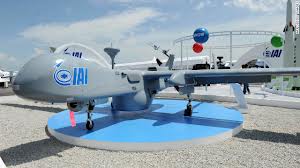Israel’s “New Army” Will Use “Technological Advantages” Including More Drones in Future Middle East Wars

Recently the Jerusalem Post reported that new budget cuts for the Israeli Defense Forces (IDF) are expected to create a “New Army” according to Israeli Defense Minister Moshe ‘Bogie’ Ya’alon. This means that Israel’s defense establishment will focus on new technology to fight its future war’s. Israel is developing advanced technologies that include the use of drones that eventually will become standard for the IDF. “We are not enslaved to technology – we are using it and adapting it to the new reality wherein the army vs army conflicts that we last saw 40 years ago in the Yom Kippur War are becoming less and less relevant.” He states that they are not enslaved to technology even though Israel has just launched a “National Biometric Data Base” system for its citizens to prevent “Fraud and Identity Theft.”
The new “National Biometric Identification Card” will be available for all citizens. It is a step towards high tech slavery for both the Israeli’s and Arabs alike although the Israeli government says it is only for a two-year trial period. After the trial period ends, they will make a decision whether or not to further implement the program based on the results. Ya’alon also said that the reforms “will help fighters operate with greater efficiency, while at the same time exploiting their human and technological advantages that will allow them to achieve victory in battle swiftly and decisively.” Drone warfare was used in the Gaza Strip in 2012. Last month the International Business Times, an online global news publication reported on a story called ‘Drones, Warriors Or Robots? Israel Debates Tomorrow’s Conflicts’ stated what Israel’s new direction is headed:
Last November, when Israel launched Operation Pillar of Defense to stop rockets fired by Palestinian militants, it did not put a single boot on the ground in Gaza. It flew drones instead. The unmanned aerial vehicles, or UAVs, initially developed for surveillance purposes, played a major offensive part during the eight-day campaign consisting of air and sea strikes. The remotely controlled aircraft fired weapons on military targets, in addition to those from Israel’s jet fighters and gunboats.
With no Israeli soldiers in the streets, unlike during the previous military campaign four years earlier, the buzz of the flying drones was a constant nightmare for people in Gaza. Around the world, that buzzing noise is not going away. Drones as war machines are here to stay, and Israel, together with the United States, is at the forefront of armed UAV development and use. In the last decade, U.S. drones have been sent on deadly missions to fight the war on terror worldwide, from Pakistan to Africa — and that’s only one aspect of the new, nonconventional way of fighting conflicts.
Israel will launch drone strikes against Hezbollah, Hamas and Syria as escalating tensions rise in the coming months ahead. As Ya’alon stated the IDF’s position on the matter:
“Due to the changing threats around us and the capabilities that the IDF has developed, we have concluded that we must lead a meaningful reform and not one that shall enslave the future for the sake of the present,” he said. “The foreseeable future is leading us to battles which will be determined by superior IDF technology, in the air, land and sea, with less heavy tools and through more and increasing use of sophisticated and unmanned technology which give us a significant advantage over any enemy.”
Israel is a leader in advanced military technology in the Middle East. According to a United Press International (UPI) report last April “Israel, which has the most advanced defense industry in the Middle East, is in the forefront of the rapidly expanding drone business that’s changing the way wars will be fought for decades to come.” With defense spending cuts, the Israeli government will be “firing 3,000 to 5,000 career soldiers and downsizing and closing flight squadrons , armored and artillery units, and naval deployments” according to the Jerusalem Post. Producing drones has proved to be a profitable industry for Israeli state-owned corporations according to UPI: “With state-owned Israel Aircraft Industries, Elbit Systems and Aeronautics Defense Systems developing new and more agile unmanned aerial vehicles, as well as ground and seaborne drones, the Jewish state seems well-placed to corner a big slice of a market valued at around $50 billion a year.” The drone industry is a major export for Israel according the Stockholm International Peace Research Institute (SIPRI) as reported by the UPI:
“The Stockholm International Peace Research Institute said Israeli companies were behind 41 percent of all UAVs exported in 2001-11. Those Israeli exports went to 24 countries, including the United States. That volume’s expected to expand as production costs are relatively low. Israeli industry officials boast that it’s significantly cheaper to buy an advanced UAV than it is to train an air force pilot”
Even an army reserve brigadier general who heads the Defense Ministry’s Research and Development division known as Mafat admitted how the IDF has been transformed: “In recent years, there have been more pilotless sorties than piloted ones in the Israeli air force.” Israel is producing enough drones in preparation for a Middle East conflict. Drones will eventually target innocent civilians that would include women and children as the world witnessed with the United States military’s drone wars in Pakistan, Yemen and Somalia. It is a form of warfare that would become barbaric, regardless of the technological advances Israel claims to have.

